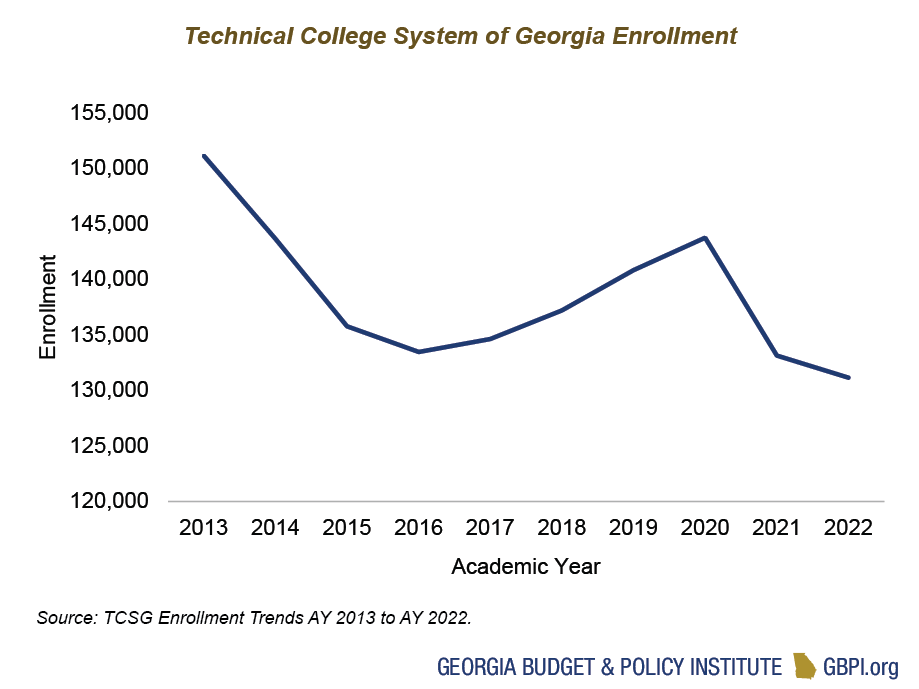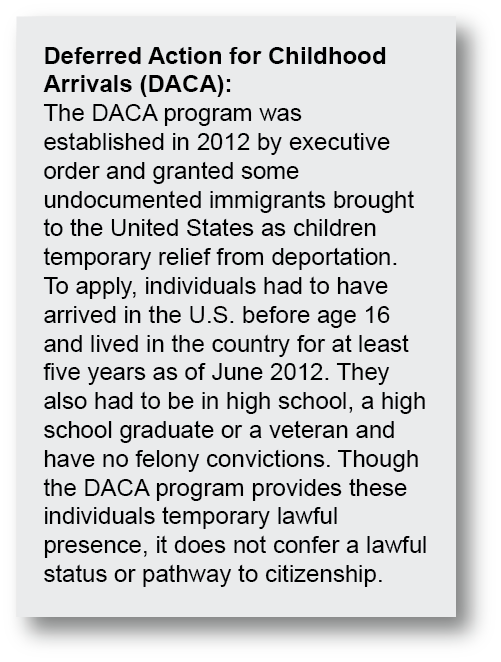This bill analysis was co-authored by Crystal Muñoz, Immigration Analyst.
![]()
In 2008, the State of Georgia began to charge undocumented students out-of-state tuition and barred them from attending certain state universities. Out-of-state tuition is two-to-four times higher than in-state tuition and remains out of reach for many immigrant families.[1] Since 2008, advocates have worked tirelessly to secure affordable tuition for undocumented students.[2]
This year the legislature is considering HB 131, The Opportunity Tuition Act, previously known as The Workforce Development Act, which will provide Deferred Action for Childhood Arrivals (DACA) recipients with a more affordable pathway to attend college.[3]
The average Georgia DACA recipient arrived in the United States when they were at least seven years old and has lived in the United States for at least 22 years.[4] However, DACA recipients are forced to pay at least two-to-four times more than the average Georgia student who qualifies for in-state tuition because the state does not consider them as being “lawfully present” in the United States.[5] [6] The cost of in-state tuition is offset by Georgia tax dollars, which affords Georgia’s students the “privilege” of paying in-state tuition for college. Although DACA recipients contribute $88.1 million annually in state and local taxes to Georgia’s tax system, they are not afforded the same privilege.[7]
The State of Georgia also provides tuition waivers to students coming from neighboring states—meaning that students who have never stepped foot in or contributed taxes to this state are able to access in-state tuition before DACA recipients actually living in Georgia and paying taxes here. Despite this, DACA recipients, undocumented students and their families who have lived in Georgia for years continue to subsidize in-state tuition for other Georgia students.[8]
What’s Broken
The Opportunity Tuition Act, although not perfect, attempts to right these wrongs by allowing “Opportunity students” or DACA recipients to pay a supplemental rate of no less than 110 percent of the in-state tuition rate if they satisfy all the requirements needed to qualify.[9] Those requirements include graduating from a Georgia high school or getting a High School Equivalency diploma. DACA recipients must also have been continuously living in Georgia since January 1, 2013.
Unfortunately, the Act comes up short in terms of equity and accessibility.
In the original version of the bill, the “opportunity tuition supplemental increase” was set to be 101 percent to 110 percent more than in-state tuition.[10] This would have amounted to a modest increase to in-state tuition. While still not equitable, this measure would have offered more affordability. In the current version, the new minimum is set at 110 percent with no maximum rate mentioned. Allowing individual institutions to set their own rate for “opportunity tuition” with no cap for the supplemental increase could potentially result in a tuition level that is higher than the out-of-state rate.
This bill also creates a two-tiered admissions system by requiring institutions in the University System of Georgia (USG) and The Technical College System of Georgia (TCSG) to prioritize in-state and qualified out-of-state applicants over opportunity students for enrollment consideration. In addition, admissions staff have the right to defer enrollment of qualified opportunity students until in-state and out-of-state applicants have been accepted, deferred or rejected. These changes create a greater challenge for students who are already systemically vulnerable, adding to the litany of barriers in their pursuit of higher education.
Inherently discriminatory admissions practices, like those outlined in HB 131, will only perpetuate oppression against undocumented immigrants. By creating a two-tier admission system, enrollment guidelines for opportunity students will inevitably lower their likelihood of gaining admission to college or delay their chances at best.
Moreover, in contrast to public discourse, the number of undocumented students wishing to pursue higher education is minimal. Data show that even in states with high immigrant populations, undocumented students, in general, represent less than two percent of the overall student population in higher education.[11] Allowing opportunity students to be considered for admission in the same applicant pool as in-state and out-of-state applicants would potentially have a nominal impact on college enrollment decisions.
The bill also places limitations on who can qualify for the opportunity tuition. Currently as written, only DACA recipients who can provide proof of residency in Georgia since January 1, 2013 are able to qualify; however, according to advocates, it may be difficult for students to provide that type of documentation especially if their parent or guardian is undocumented. Because the bill restricts opportunity tuition to DACA recipients, 35,000 Georgia undocumented youth will have to continue to pay out-of-state tuition if they wish to pursue higher education at a Georgia public college or university.[12]
Georgia Can Do Better
Limiting legislation to DACA students—as HB 131 does—means that Georgia misses a prime opportunity to educate all undocumented students. On average, Georgia has approximately 3,000 undocumented and DACA students who graduate high school each year at a cost to the State of Georgia of approximately $6,000 per pupil, per year.[13] Expanding opportunity tuition to all undocumented students would not only complete the K-16 education pipeline investment, but it would also prove Georgia’s dedication to inclusivity.
By excluding undocumented students and only offering opportunity tuition rates to DACA recipients, Georgia lawmakers miss the mark and miss the moment.
Making college accessible is more important than ever as the problem of college affordability has become increasingly urgent. In 2001, the Georgia higher education state budget covered 75 percent of the post-secondary cost, and students were responsible for 25 percent. Currently, the state is responsible for 57 percent, and students must cover the remaining 43 percent. Continued divestment by the state in higher education coupled with an 18 percent increase in student/family fiscal responsibility in just two decades has resulted in many students struggling to pay in-state tuition.[14]
In addition to paying high tuition rates, undocumented students do not qualify for the federal Pell grant nor state funding such as HOPE and the Zell Miller scholarship.[15] Providing undocumented immigrants access to the full in-state tuition rate helps students afford college. Although HB 131 does not address in-state financial aid, expanding eligibility for HOPE and Zell Miller Scholarship would substantially decrease the obstacles that undocumented students who wish to attend college face.
Unfortunately, Georgia is not alone in the challenges it presents to degree-seeking DACA recipients and undocumented individuals. Georgia, Alabama and South Carolina are the most discriminatory states in the nation when it comes to DACA and undocumented student access to higher education. Joining states like Kentucky and Florida in offering in-state tuition would offer a viable solution and encourage more undocumented students to enroll in college.[16]
Serving Undocumented and DACA Students Means Meeting Workforce Needs
Undocumented students benefit from attending K-12 schools in Georgia. However, students are often left with little-to-no options for post-secondary education or training due to unjust policies and college affordability. HB 131 would decrease barriers for DACA students to pursue postsecondary education, providing students with the support needed to obtain gainful employment.
 If HB 131 passes, it could make a direct impact on opportunities for DACA students and potentially address sharply declining enrollment in TCSG, a critical conduit for workforce training and preparation. TCSG has experienced a significant drop in enrollment since 2013 with an approximate decline of 30,000 students across the state. The graph below shows the history of TCSG student enrollment from 2013 to 2023.
If HB 131 passes, it could make a direct impact on opportunities for DACA students and potentially address sharply declining enrollment in TCSG, a critical conduit for workforce training and preparation. TCSG has experienced a significant drop in enrollment since 2013 with an approximate decline of 30,000 students across the state. The graph below shows the history of TCSG student enrollment from 2013 to 2023.
TCSG Commissioner Greg Dozier stated that there are many high-demand areas that lack workers, including areas such as nursing, early childhood education and aviation.[17] Lower tuition for DACA students could potentially help meet Georgia’s workforce demand. For instance, Georgia is a niche aviation state, and it is the second largest industry in the state.[18] As such, preparing as many students as possible for careers in aviation, including DACA students, is a step in the right direction.
Conclusion
There are flaws in HB 131’s approach to in-state tuition for DACA recipients that cannot be ignored. Incremental change alone, as laid out in this bill, is not enough. For Georgia to reap the full benefits of equitable higher education access for DACA students and undocumented immigrants, a comprehensive approach to college affordability for those students and all students is needed.
Before lawmakers argue about “workforce shortages,” they should examine the current policies that prevent all students from easily accessing post-secondary options to prepare for the workforce. Equity should be at the center of HB 131 and all post-secondary policy decisions. This session, lawmakers can change the status quo by making higher education more attainable for immigrant families.
End Notes
[1] Lee, J. & Angel, S. (2020, February 21). Every Georgian deserves access to higher education. Georgia Budget and Policy Institute. Retrieved March 1, 2023 from https://gbpi.org/every-georgian-deserves-access-to-higher-education/
[2] Tuition Benefits for Immigrants. National Conference of State Legislatures. Retrieved February 21, 2023 from https://www.ncsl.org/immigration/tuition-benefits-for-immigrants
[3] Workforce Development Act, House Bill 131. (2023). https://www.legis.ga.gov/legislation/63761
[4] DACA Decade: From student to careers and families. FWD.US. Retrieved February 21, 2023, from https://www.fwd.us/news/dacas-beneficiaries-after-10-years/
[5] Tuition benefits for immigrants. National Conference of State Legislatures. Retrieved February 21, 2023 from https://www.ncsl.org/immigration/tuition-benefits-for-immigrants; Kuck, C. (2017, June 15). Why DACA students must be able to pay in-state tuition in Georgia. Kuck-Baxter Immigration (blog). https://www.immigration.net/2017/06/15/why-daca-students-must-be-able-to-pay-in-state-tuition-in-georgia/; Board of Regents Policy Manual, 4.1.6 Admission of persons not lawfully present in the United States. https://www.usg.edu/policymanual/section4/C327/; Alford v. Hernandez (Charles Kuck was attorney for plaintiff students; case was litigated from Fulton County Superior Court, through Georgia Court of Appeals, Georgia Supreme Court, to the 11th Circuit Court of Appeals; for Fulton County Judge’s order, see: https://drive.google.com/file/d/0B_6gbFPjVDoxcFVPSUZyVVNaZWM/edit?resourcekey=0-MoHIIv28vjBfTBygzmD4SQ)
[6] Lee, J. & Angel, S. (2020, February 21). Every Georgian deserves access to higher education. Georgia Budget and Policy Institute. Retrieved March 1, 2023 from https://gbpi.org/every-georgian-deserves-access-to-higher-education/
[7] The Demographic and Economic Impacts of DACA Recipients: The Fall 2021 Edition. Center for American Progress. Retrieved February 21, 2023 from https://www.americanprogress.org/article/the-demographic-and-economic-impacts-of-daca-recipients-fall-2021-edition/?_ga=2.89726427.1113412642.1654781943-1292921797.1654294269
[8] New Americans in Georgia. American Immigration Council. Retrieved February 21, 2023 from https://map.americanimmigrationcouncil.org/locations/georgia/#
[9] House Bill 131, “The Opportunity Tuition Act”, LC 49 1330 S, Line 45.
[10] House Bill 131, “The Workforce Development Act”, LC 49 1187, Line 45. https://www.legis.ga.gov/legislation/63761
[11] Undocumented students in higher education how many students are in U.S. colleges and universities, and who are they? (2019). Higher Ed Immigration Portal. Retrieved March 1, 2023 from https://www.higheredimmigrationportal.org/wp-content/uploads/2021/02/Undocumented-Students-in-Higher-Education-Updated-March-2021.pdf
[12] Migration Policy Institute. Deferred Action for Childhood Arrivals (DACA) data tools. Migration Policy Institute.
Retrieved February 28, 2023 from https://www.migrationpolicy.org/programs/data-hub/deferred-action-childhood-arrivals-daca-profiles
[13] Presidents’ Alliance. (2023, February 3). Georgia – Data on immigrant students | Higher ed immigration portal. (2023, February 3). Presidents’ Alliance. https://www.higheredimmigrationportal.org/state/georgia/; $5,751.10 is the amount allocated in the Quality Basic Education (QBE) school formula per student in FY 2022. See, Owens, J. (2022, January 6). State of education funding (2022). https://gbpi.org/state-of-education-funding-2022/
[14] Purdue, S. (n.d.). Georgia general assembly 2023 joint budget hearings [Slide show]. https://www.legis.ga.gov/api/document/docs/default-source/house-budget-and-research-office-document-library/2023-joint-budget-hearings/university_system_of_georgia.pdf?sfvrsn=988b9e51_2
[15] Georgia Student Finance Commission. Basic eligibility | Georgia Student Finance Commission. Retrieved February 16, 2023 from https://www.gafutures.org/hope-state-aid-programs/hope-zell-miller-scholarships/hope-scholarship/basic-eligibility/
[16] Presidents’ Alliance. (2023, February 6). U.S. state policies on DACA & undocumented students | Higher ed immigration portal. https://www.higheredimmigrationportal.org/states/
[17] Technical College System of Georgia. (n.d.). Free tuition – TCSG. https://www.tcsg.edu/free-tuition/
[18] Georgia Department of Economic Development. Aerospace manufacturing companies & engineering in Georgia. (n.d.). www.georgia.org. Retrieved February 17, 2023 from https://www.georgia.org/industries/aerospace










